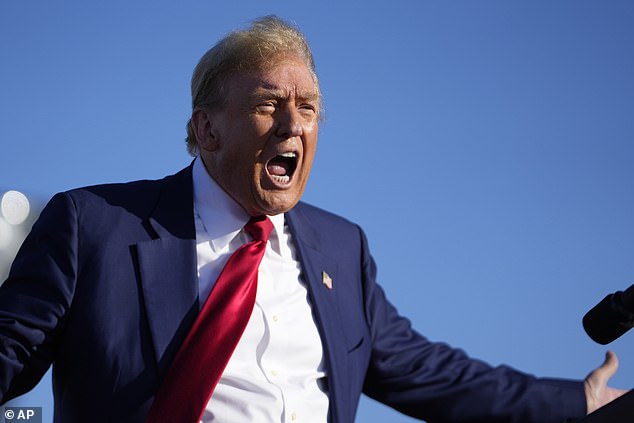Donald Trump has revealed what he will do in November if he loses the 2024 presidential election and concerns about the integrity of the election persist.
The former president spoke with Milwaukee Journal Sentinel about issues related to electoral authenticity during a recent interview.
His comments came after a rally in Waukesha, Wisconsin. The Midwestern state will be key to the presidential election and will host the 2024 Republican National Convention, where Trump is expected to be formally nominated as the party’s candidate to face Democrat Joe Biden.
‘If everything is honest, I will gladly accept the results. I won’t change that,” Trump said. “If not, we have to fight for the rights of the country.”
The comments had echoes of his elections 2020 denial claims, which were fundamental to his attempt to overthrow Biden. Accusations of voter fraud were a catalyst that prompted a mob to storm the Capitol on January 6 to protest the certification of the election.
Donald Trump has revealed what he will do in November if he loses the 2024 presidential election
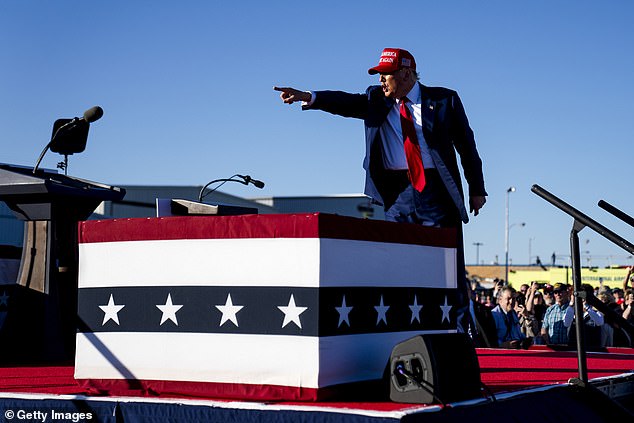
His comments came after a rally in Waukesha, Wisconsin. The Midwestern state will be key to the presidential election and will host the 2024 Republican National Convention.
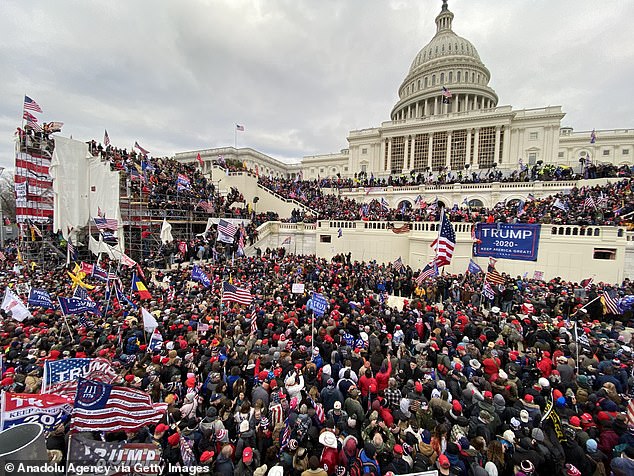
Trump told the crowd on January 6, “if you don’t fight like hell, you won’t have a country anymore.”
Trump told the crowd on January 6, “if you don’t fight like hell, you won’t have a country anymore.”
In Wednesday’s interview, Trump repeated the lie that he had, in fact, won Wisconsin in 2020.
“If you look back and look at all the things that were discovered, it shows that I won the election in Wisconsin,” Trump said. “It also showed that I won elections in other places.”
His claims were refuted after a Republican-backed recount and reviews found no evidence of voter fraud as Trump claimed.
President Biden won Wisconsin in 2020 by just over 20,000 votes, obtaining 1,630,866 votes compared to Trump’s 1,610,184. Trump previously won the state in 2016.
Trump’s latest interview and statements come as he faces a series of criminal cases. Trump has been charged with obstruction in special counsel Jack Smith’s criminal case against him for election interference.
However, the Supreme Court appears to be questioning whether federal prosecutors went too far in bringing obstruction charges against hundreds of participants in the Jan. 6 riot.
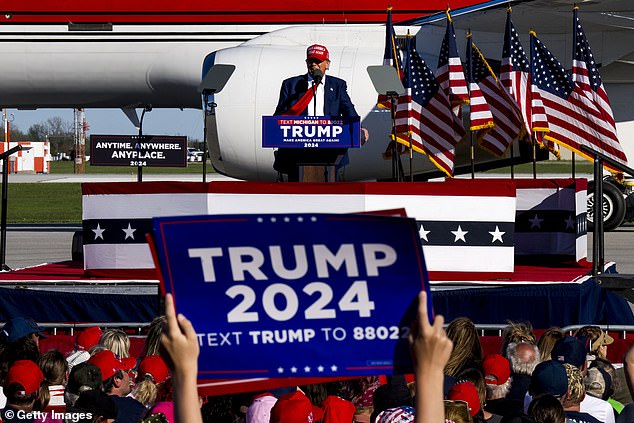
‘If everything is honest, I will gladly accept the results. I don’t change that,” Trump said in his most recent interview. ‘If not, we must fight for the right of the country’
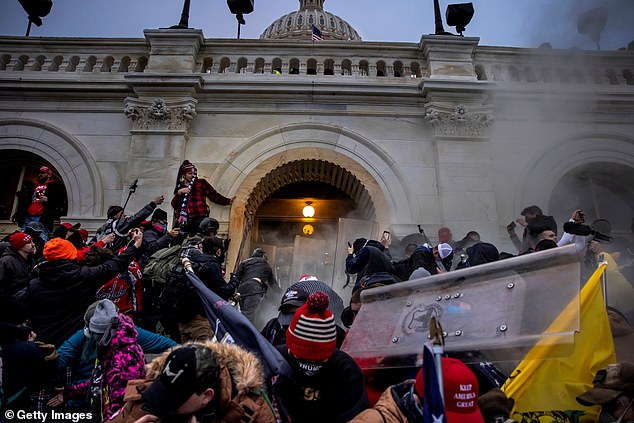
The former president faces federal charges in relation to the events of January 6
If the court finds that prosecutors overstepped their bounds, it could have far-reaching consequences for Trump, who faces the same charge for his efforts to overturn his 2020 election loss.
Conservative Supreme Court justices are skeptical of an obstruction charge against a former police officer who entered the Capitol on Jan. 6.
Joseph Fischer, was charged with assaulting a police officer, disorderly conduct at the Capitol, and obstruction of a congressional proceeding on January 6, 2021.
Fischer asked the court to dismiss the felony obstruction charge, arguing that the law he is accused of violating was only intended to apply to tampering with evidence, not to events like Jan. 6.
Conservative justices pressed Attorney General Elizabeth Prelogar on using the law’s provision.
Justice Clarence Thomas asked if the provision had ever been used in other protests in the past.
Prelogar said it had been used in a variety of processes that do not focus on evidence tampering.
“Now I can’t give you an example of how to apply it in a situation where people have violently broken into a building to prevent an official procedure,” he admitted.
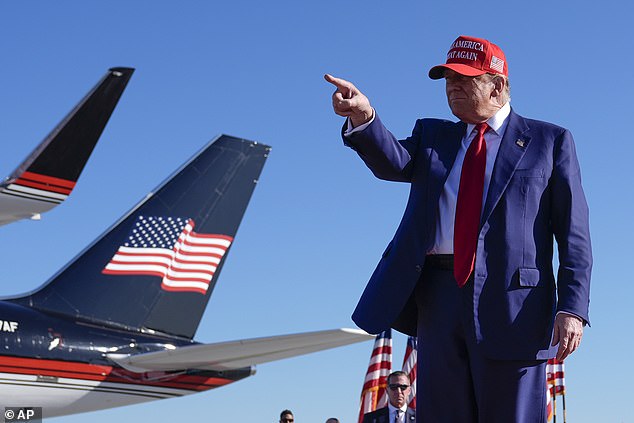
The Supreme Court appears to be questioning whether federal prosecutors went too far in bringing obstruction charges against hundreds of participants in the Jan. 6 riot.
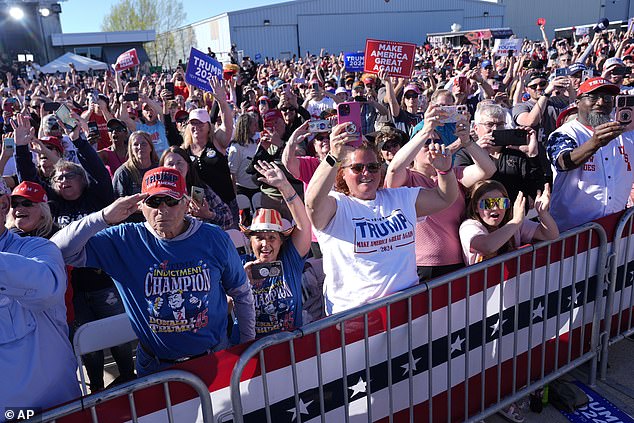
Supporters react as Republican presidential candidate former President Donald Trump speaks at a campaign rally in Freeland, Michigan, on May 1.
“But that’s only because I’m not aware of that circumstance occurring before Jan. 6.”
The Supreme Court sensationally restored Trump to the ballot after attempts to remove him from office in several states for his alleged role in inciting the Jan. 6 mob.
The justices ruled a day before the Super Tuesday primaries that states cannot invoke a post-Civil War constitutional provision to prevent presidential candidates from appearing on the ballot.
That power resides with Congress, the court wrote in an unsigned opinion.
The former president returned to the campaign trail Wednesday while taking a break from court. Trump used rallies in Wisconsin and Michigan to criticize the criminal and civil cases against him and criticized the chief justices and President Biden.
The events were the first campaign rallies Trump has held since the hush money trial against him began in New York nearly three weeks ago.
Trump is charged with 34 counts of falsifying business records for covering up money payments to porn star Stormy Daniels.

